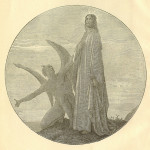We run our website the way we wished the whole internet worked: we provide high quality original content with no ads. We are funded solely by your direct support. Please consider supporting this project.

4 Reasons to Wake Up to the Warfare Worldview
Image by postbear via Flickr
A view of the world that grounds the problem of evil in spiritual warfare is not one that many modern people find easy to accept. To many contemporaries, the notion is preposterous that real, semi-autonomous, self-determining, and invisible spirits exist that can and do influence our lives. The whole thing sounds to them more like something out of a Star Wars movie than like serious contemporary theology.
Our perspective of the world has been colored by materialistic presuppositions, and this, up until recently, has been leaving less and less room for a belief in such things as angels and demons.
Outside of the fact that the Bible makes it clear that there is a real spiritual war transpiring, there are four reasons why we are poised to wake up to the reality of the warfare worldview:
- The Move Beyond Materialistic Assumptions. The dominance of the Enlightenment rationalistic and naturalistic assumptions concerning the nature of reality and the means by which we know it is rapidly waning. There is now an increasing openness to, if not explicit awareness of, “nonordinary reality.” We are becoming aware that the Western materialistic worldview is (as all worldviews to some extent are) a social construct. It is a construct that seems to have in part evolved precisely to censor out all aspects of reality that are not manageable by empirical techniques. But it thereby blinded us to those dimensions of reality that were beyond our control, including the world of the Spirit.
But this is changing. There is now an increasing appreciation for and validation of the “commonsense” assumption of nearly every culture outside our own that the world is not simply physical. Western culture is in many respects beginning to relearn what many primitive people have, in however a distorted form, never forgotten: The cosmos is a veritable society of intelligent interacting beings, some of whom are not physical.
- The Church’s Experience of Spiritual Warfare. Over the last 4 decades, we have witnessed major segments of the Western church abandoning wholesale their previous modernistic mindset, which held that spiritual warfare was at best peripheral to the life of the church. The overall result of this new spiritual climate is that the parameters of what many Western believers have previously regarded as being “normal” Christianity are being stretched. This is a positive development. It means that the climate is ripe for a restoration of a NT model of the church as the supernaturally empowered body of Christ that carries on the work which the Son began.
- The Questioning of the Classical View of Diety. We are now living in an age in which the classical views of God—that is, unmoved, impassible, immutable, nontemporal, and purely actual—are becoming less and less persuasive, if not altogether unintelligible, to people in Western culture. The notion that “divine perfection” necessarily implies changelessness, atemporality, pure actuality and impassibility is, at least in some quarters, no longer taken as self-evident. This rethinking of the nature of God provides greater opportunities to investigate whether these attributes are really biblical. The more these attributes are questioned, the more we can understand God and his relationship to the world to include the sort of contingency, openness and risk that is essential to a genuine warfare perspective of the world.
- The Experience of the Demonic. Arguably, never before has humanity as a whole experienced the amount, the depth and the intensity of evil that we experienced in the twentieth century. This reality has to affect our understanding of the reality of the spiritual battle. It makes simple answers and reassuring clichés harder to swallow. Consider the Holocaust. The depth of the evil despoils the myth of the divine blueprint, where we can presume that God controls everything. It can be rendered intelligible only by the category of the demonic.
I am convinced that our Western culture, and especially the Western church, is positioned to reconsider the warfare worldview of the NT and the early church—even through it runs contrary to certain fundamental aspect of both the Western church’s classical theological assumptions as well as our culture’s naturalistic orientation.
Category: General
Tags: Culture, Demons, Evil, Satan, Spiritual Warfare, Warfare Worldview, Western Assumptions
Topics: Spiritual Warfare, Cosmic Conflict
Related Reading

Put on the Armor of God
The whole of the Christian life is an act of war against the enemy as we follow Jesus in storming the gates of hell (See post.) No passage better illustrates this than Paul’s metaphor of spiritual armor from Ephesians 6. He writes that Christians are to “be strong in the Lord and in the strength…

The Final Battle in Revelation
I will conclude this series on the violent imagery in Revelation by addressing the infamous eschatological battle scene found in 19:11-21, for it is this graphically violent section of Revelation that is most frequently appealed to by those who argue against the claim that Jesus reveals an enemy-loving, non-violent God that is unconditionally opposed to…

The Cross and Cosmic Warfare
Since the time of Anselm in the 11th century, Western theology has focused almost all of its attention on the anthropological dimension of the atonement. In the most popular understanding, the chief thing that God was accomplishing on the cross was satisfying God’s perfect justice and thereby atoning for our sins. The work of the…

Book Review: Understanding Spiritual Warfare: Four Views
I just got the pre-release copy of Understanding Spiritual Warfare: Four Views, edited by my friends James Beilby and Paul Eddy (IVP, 2012). The introduction alone is worth the price of the book! It is the clearest, most comprehensive, yet most succinct overview of the concept of spiritual warfare throughout church history that I’ve ever…

On Attending to the Light in Darkness
Joe Spurr via Compfight Donald Miller has posted a reflection on his Storyline blog about highlighting goodness and thereby pointing to Jesus in the aftermath of events such as the bombing in Boston this week. We want to emphatically declare together that “an enemy has done this” (Matt 13:28). But we also want to be a people…

Engaging the Culture
Mark McIntyre shares some thoughts here on the culture wars that often define our relationship to the world outside of the Church. We are called to be a people who are known by our love rather than our stance on this or that social issue. Are we really known this way? Mark’s words are a…
